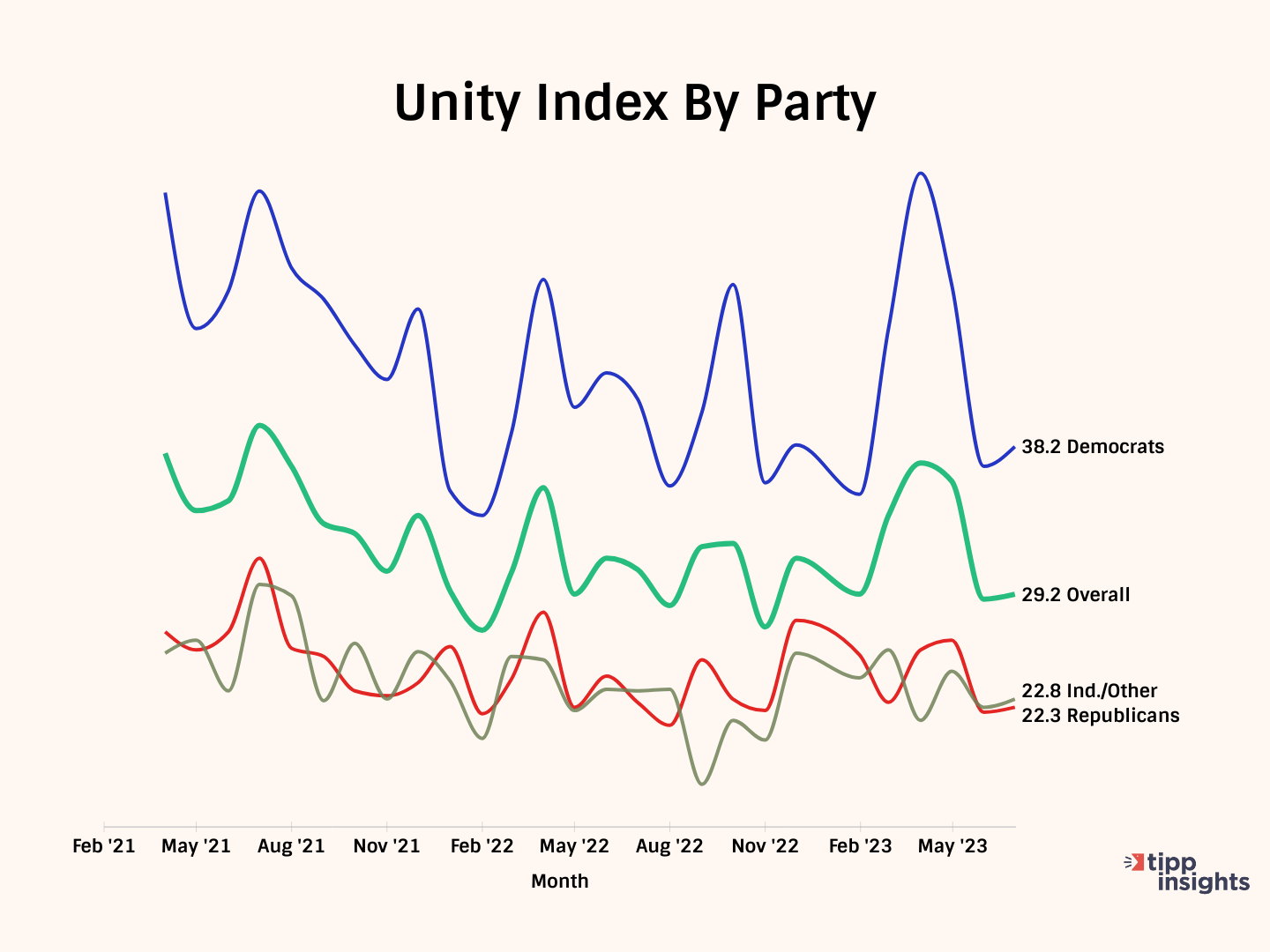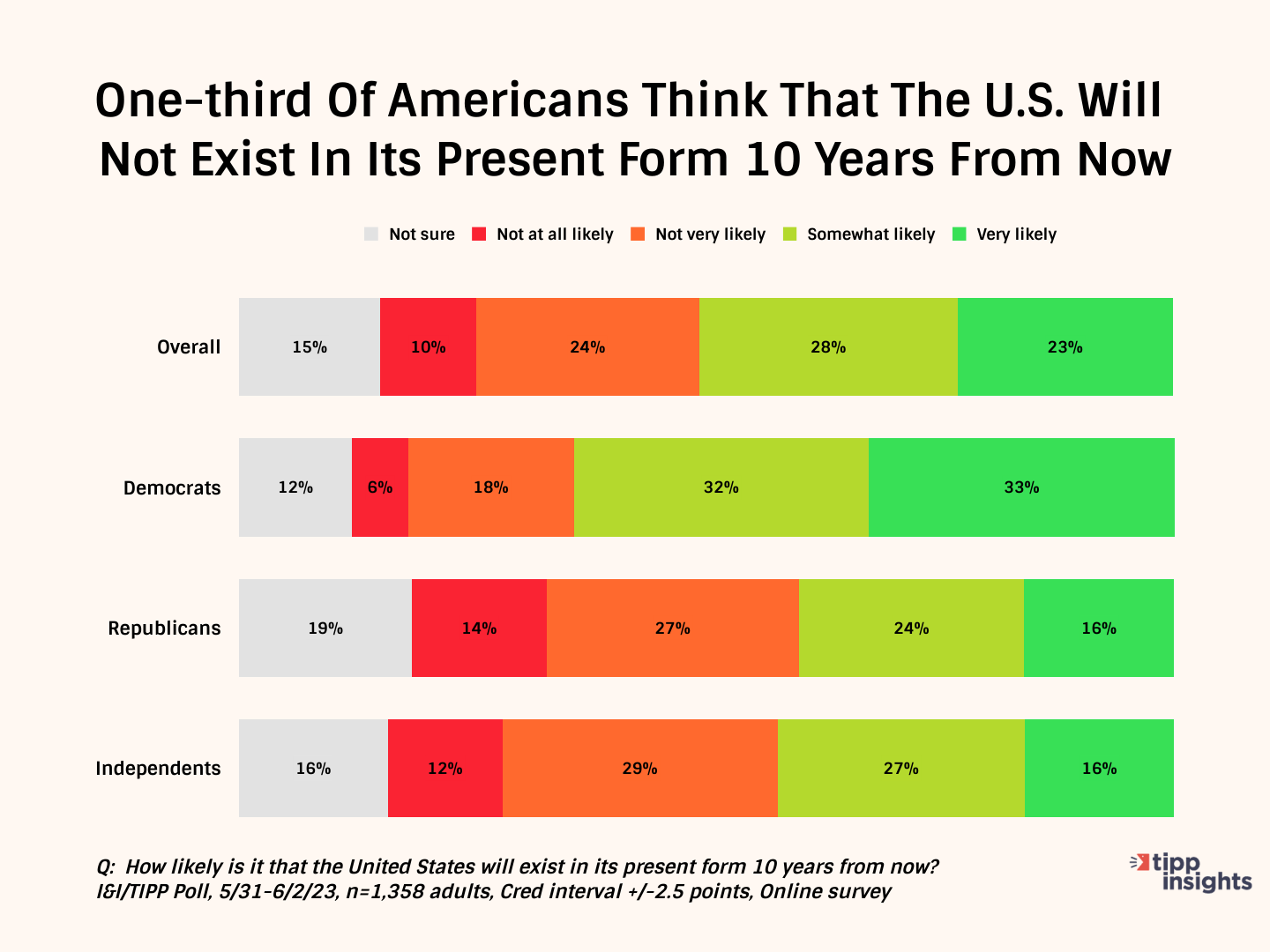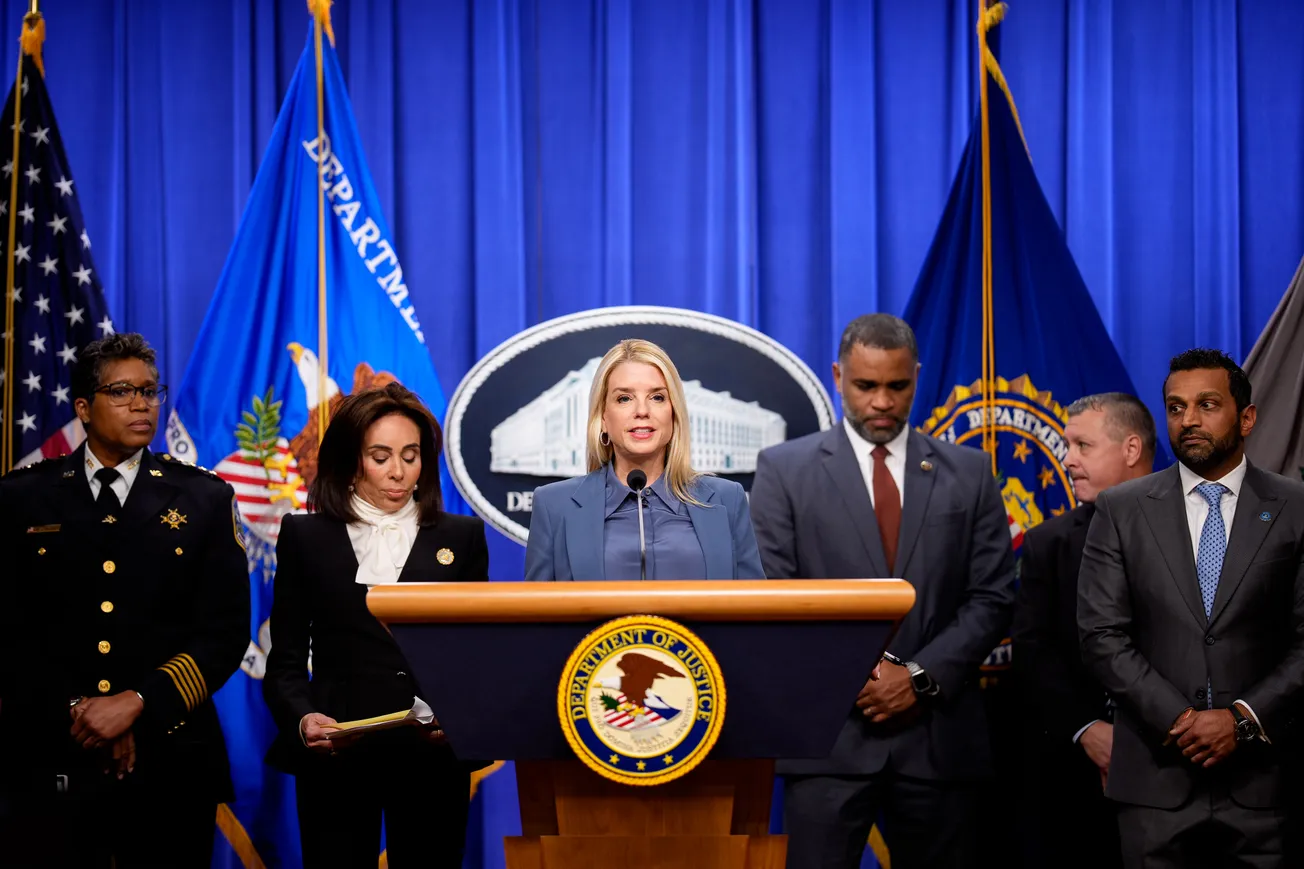How are Americans feeling these days? Certainly not united. Our nation appears to be indivisible in name only. Even more surprising, a significant number of people have even begun to wonder if the United States of America as we know it will even exist in the future, data from the latest I&I/TIPP Poll shows.
Starting with the Unity Index, the proprietary I&I/TIPP gauge of national harmony, we ask people each month if they feel our common bond remains. They are then given five possible responses: "very united," "somewhat united," "somewhat divided," "very divided" or "unsure."
For June's national online I&I/TIPP poll of 1,358 adults, taken from May 31-June 2, just 24% of respondents declared that they felt the U.S. was "united." Among that group, only 9% said the U.S. was "very united," while 15% called it "somewhat united."
But by nearly 3-to-1, 74% of respondents called America "divided." Of those, 42% said it was "very divided," while 32% termed it "somewhat divided."
Only 2% described themselves as "unsure."

That America is divided might, ironically, be one of the few things that all ideologies and political parties have in common. Substantial majorities of Democrats (34% united, 65% divided), Republicans (18% united, 80% divided), and independents (17%, 79%) agreed.
But what, or who, is to blame? President Joe Biden has repeatedly vowed to pursue a policy of "unity" over division since his inauguration, and even pledged to pursue a "bipartisan unity agenda" in his 2022 federal budget proposal.
Sadly, most Americans don't see it that way. We asked in this month's poll the following question: "To what extent do you agree or disagree with the following statement: President Biden's actions have united the country."
Just 34% agreed, while 59% disagreed. Another 8% weren't sure.
But here is where partisan politics clearly shows up. Among Democrats, 53% said Biden's policies and actions united the country, while 38% disagreed. For GOP members, the equivalent numbers were 16% agree and 81% disagree. Independents came out 25% agree, 67% disagree.

And the long-term index, which allows I&I/TIPP to compare monthly trends over time, shows a clear disparity between Democrats on one side, and Republicans and independents on the other.

Of any broad demographic group, minorities had perhaps the most favorable take for Biden: American blacks and hispanics broke about even on Biden, 44% agree to 46% disagree. Whites, meanwhile, came in at just 28% agreeing Biden had united the country, versus 65% who disagreed.
By gender, Biden seems to have a problem among women. Some 38% of men agreed Biden had united the country, compared to only 29% of women. Male disagreement stood at 55%, compared to 63% for women.
The I&I/TIPP Poll asked a bonus question this month, one intended to perhaps better understand the apparent angst Americans have today about being a unified country: "How likely is it that the United States will exist in its present form 10 years from now?"
The response was disquieting: A bare majority of 51% said it was "likely," while 34% said it was "unlikely." Another 15% said they were "unsure."

Once again, the politics of the respondent made all the difference. Of Democrats, 64% thought America would remain basically the same a decade from now, versus 24% who said it wouldn't. That compares to 40% of Republicans who thought America would exist in its current form, while a slender majority of 41% didn't. Independents were deadlocked at 42%-42%.
These data come as Americans on all sides of the political spectrum have wondered out loud in recent years and months whether America could, or even should, hold together given its growing regional, ideological and cultural differences.
A poll taken in September 2021 by the Center for Politics at the University of Virginia discovered that 50% of Donald Trump voters and 40% of Joe Biden voters agreed largely on one thing: That the U.S. should split up, with the blue and red states going their separate ways.
The political cleavages are significant, that poll noted: "A strong majority of Trump voters see no real difference between Democrats and socialists, and a majority of Biden voters at least somewhat agree that there is no real difference between Republicans and fascists."
Even the solidly establishmentarian Council on Foreign Relations was forced to admit after the 2020 presidential election that "what the election revealed is one country and two nations. They will have to coexist; whether they can work together remains to be seen."
A YouGov Poll, taken in June 2021, five months after the Jan. 6 demonstrations at the U.S. Capitol, found support for a U.S. breakup was surprisingly high.
“Republicans are most secessionist in the South and Mountain regions whereas it is Democrats on the West Coast and in the Northeast,” according to Bright Line Watch, which sponsored the poll. “In the narrowly divided Heartland region, it is partisan independents who find the idea most attractive.”
Is it true, as the poet Yeats once said, that "Things fall apart; the center cannot hold." America is undergoing serious social turmoil these days, with voters seemingly unable to come together and agree on anything.
That said, the nation's founders created a flexible system of government, and we've been through periods of severe social stress before — including mass migrations, an Industrial Revolution, a Great Depression and a Civil War. We're still here, the richest, most powerful nation in history, one guided by what many consider to be the greatest political document ever: Our Constitution.
Will Americans give that up?
I&I/TIPP publishes timely, unique, and informative data each month on topics of public interest. TIPP’s reputation for polling excellence comes from being the most accurate pollster for the past five presidential elections.
Terry Jones is an editor of Issues & Insights. His four decades of journalism experience include serving as national issues editor, economics editor, and editorial page editor for Investor’s Business Daily.
Like our insights? Show your support by becoming a paid subscriber!








